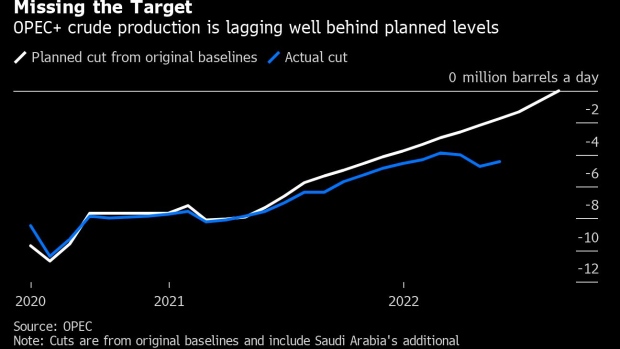Aug 1, 2022
OPEC+ to Reveal Whether Biden Succeeds in Quest for More Oil
, Bloomberg News

(Bloomberg) -- Sign up for our Middle East newsletter and follow us @middleeast for news on the region.
Joe Biden took a political gamble with his visit to Saudi Arabia last month, courting a kingdom he once vowed to punish in a quest for more oil supplies. This week will reveal whether it paid off.
Biden said he expected “further steps” from the Saudis to cool oil prices and safeguard the global economy at the close of his trip to Jeddah two weeks ago. The OPEC+ producers’ coalition led by Riyadh will decide on Wednesday whether to oblige, though delegates warn that any supply boost would be modest -- and may not materialize at all.
Oil prices retreated last month but are still near $100, making the inflationary squeeze from fuel costs a pressing issue for the White House. Yet the Saudis and their partners remain wary of feeding more barrels into a fragile global market, and feel a need to marshal what’s left of their unused output carefully, officials say.
“President Biden and his advisors left Riyadh exuding high confidence of further OPEC+ steps within weeks,” said Bob McNally, president of Washington-based consultant Rapidan Energy Group and a former White House official. “If OPEC+ keeps supply flat, team Biden will have some explaining to do.”
Diplomatic Climbdown
Biden’s meeting with Saudi King Salman bin Abdulaziz and his son, Crown Prince Mohammed Bin Salman, marked a diplomatic climbdown for the president, who promised in 2018 to isolate Riyadh over the killing of Washington Post columnist Jamal Khashoggi. Biden said the Saudi rulers recognize the “urgency” of keeping markets well supplied.
The kingdom has already shown some goodwill, steering the Organization of Petroleum Exporting Countries and its allies to make extra production increases in July and August. Those hikes completed the reversal of unprecedented cutbacks made during the Covid-19 pandemic, amounting to almost 10 million barrels a day, or roughly 10% of world supplies.
The 23-nation alliance will gather online on Wednesday to calibrate production levels for September, and US officials are confident it will agree a further boost.
With most OPEC+ members unable to increase production further because of inadequate investment or operational disruptions, any additional supplies would need to come from the Saudis and their neighbors, the United Arab Emirates.
But it’s far from clear that Riyadh sees the need to act now. The kingdom’s public response has been guarded, with Foreign Minister Adel Al-Jubeir acknowledging only that it would respond in the event of a supply shortage.
China Concerns
Oil demand continues to face headwinds in the world’s leading consumers, with the US economy still haunted by the prospect of recession and China slowly re-emerging from another wave of pandemic-related lockdowns. Holding output steady would also avoid a rupture with Russia, a critical member of the alliance, which faces oil sanctions over its invasion of Ukraine.
After a meeting between Russian Deputy Prime Minister Alexander Novak and Saudi Energy Minister Prince Abdulaziz bin Salman last week, the two nations reaffirmed their commitment to the OPEC+ agreement and a stable oil market.
“I think they’ll do very little,” said Christof Ruhl, senior analyst at Columbia University’s Center on Global Energy Policy. “After the Biden visit they might pay a bit of lip service, but not produce much more in fact, and even the promise won’t be earth-shattering. They’re genuinely worried about a recession.”
OPEC+ could formally agree to continue with the monthly increases of about 400,000 barrels a day it has adopted over the past year, with the understanding that only part of this would be implemented because of several members’ capacity constraints. The group is collectively pumping about 2.8 million barrels a day below its collective target.
“They are going to continue to add a little bit given how tight the market is,” Amrita Sen, director of research at consultants Energy Aspects Ltd. said in a Bloomberg television interview. “The reality is very few of these countries even have spare capacity.”
Spare production capacity, largely confined to Saudi Arabia and the UAE, has been whittled down to a “razor-thin” level of just over 2 million barrels a day, or about 2% of global demand, according to the International Energy Agency in Paris. Riyadh is wary of exhausting this when global markets remain so vulnerable to disruptions, from Libya to Russia and beyond.
Some oil analysts believe that the buffer could be even lower, and speculation has been stoked by French President Emmanuel Macron, who was overheard last month at the G-7 summit claiming that UAE ruler Sheikh Mohammed bin Zayed had admitted the Gulf heavyweights were virtually tapped out.
The UAE’s Energy Minister Suhail al Mazrouei promptly sought to clarify that his ruler been referring to quota limits agreed with fellow OPEC+ members, but uncertainty persists. Saudi production is scheduled to reach about 11 million barrels a day this month, a level the kingdom has rarely maintained for a prolonged period in its decades as an oil exporter.
“It’s entirely unclear how much Saudi Arabia will raise production,” said Jan Stuart, global energy economist at Piper Sandler & Co. in New York. “The Saudis don’t ever want to give the impression they’ve given the Americans any kind of special treatment. In any case, we don’t believe they have all that much left to give.”
©2022 Bloomberg L.P.





